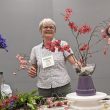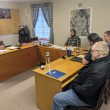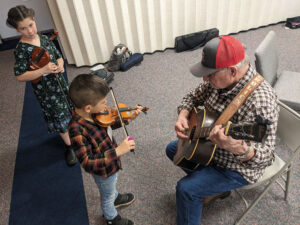The halls of the Mennonite Church were abuzz with activity for at least 12 hours on a warm Saturday as out-of-towners found corners in the building to perfect a song on their musical instruments.
Throughout the church a range of tones in tweedles and twangs bumped up against each other as fiddlers warmed up for their time on the stage to compete in the 58th annual Oregon State Open Fiddle Contest on March 16.

For the third year in a row, Lebanon was the site for fiddlin’ fiddlers to compete in the contest organized by the Oregon Old-Time Fiddlers Association (OOTFA).
Lebanites Jerry Parks and Saxon Ropp were among the approximate five dozen musicians who participated for a chance to win cash prizes and certification for the national contest. Parks did not make the top five this year, citing a home remodeling project as cause for a less than stellar performance, but Ropp earned a $75 prize for fourth place in the young adult division.
All the other competitors came from as near as Albany and as far away as all surrounding neighboring states.
This was Cat McClintock’s first year chairing the contest. She started playing the fiddle when she lived in Colorado at the turn of the century, and then found herself in a “fiddle desert” when she moved to North Dakota. Now she resides in California.
“When I came to the Pacific Northwest, I came to my first contest last year (here in Lebanon). That’s the first time I met many of these people,” she said.
Yet she was already familiar with many of them because she’d been watching them compete at the national contest for years. She calls herself a “fiddle contest super-fan,” so meeting the musicians at the Oregon contest in Lebanon was like meeting famous people.
The burning question which always makes its round is among the curious – or those looking to elicit some sort of good-natured ribbing – is, “What is the difference between a fiddle and a violin?”

McClintock said “there’s so many answers to that question,” but it comes down to how the instrument is played. It’s a different art to play the violin versus the fiddle, she explained, but the standard answer is that the violin sings and the fiddle makes you dance.
While the instrument is exactly the same, the music is very different, fiddler Andy Emmert added. Violinists are led by a conductor and spend “massive amounts” of time on technique, but fiddlers spend more time choosing their songs, and they “hang out and get to go play in barns and they get to go play in contests.”
The violin/fiddle is ranked the hardest instrument to play, Parks said.
“All of the other instruments either have frets or they’ve got keys; the fiddle has nothing,” he said. “You’ve got to put your finger in the right spot and then you gotta operate the bow, too. It’s a very difficult instrument to play and make sound good.”
Plus they don’t perform off sheet music but, rather, off memory, which adds another degree of difficulty. And like many things, fiddling is a craft that seems to be slowly dying out, he said.
Yet among the range of age categories for the contest, there were far more children signed up to compete than adults. Despite districts sloughing off music classes from their schools, kids have found skilled fiddlers who will teach them how to play and, Parks said, the contest acts as a sort of recital for them.
“We’ve got a lot of kids that play, but they don’t come to our functions,” Parks said before half-jokingly adding, “If you come to one of our jams, we’re all old people.”











